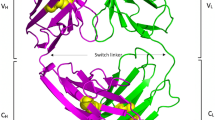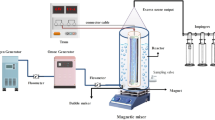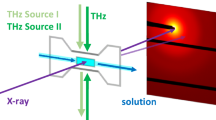Abstract
ALTHOUGH oxygen usually increases the sensitivity of biological systems to ionizing radiations, it was found that with the enzymes chymotrypsin1 and trypsin2, in dilute aqueous solutions, the presence of air as compared with vacuum diminished the sensitiveness by a factor of about 3. In these experiments the enzyme was dissolved in 10−3 N hydrochloric acid, in which it was believed to be most stable. We have now, in the case of trypsin, examined the effect of varying the pH of the solution in which it is dissolved and find that the effect of oxygen is markedly dependent on the pH. Some typical figures of the specific inactivation dose to 220-kV. X-rays are given in Table 1 (in rads/gm./ml.).
This is a preview of subscription content, access via your institution
Access options
Subscribe to this journal
Receive 51 print issues and online access
$199.00 per year
only $3.90 per issue
Buy this article
- Purchase on SpringerLink
- Instant access to the full article PDF.
USD 39.95
Prices may be subject to local taxes which are calculated during checkout
Similar content being viewed by others
References
Butler, J. A. V., Robins, A. B., and Rotblat, J., Proc. Roy. Soc., A, 256, 1 (1960).
Butler, J. A. V., and Robins, A. B., Nature, 186, 697 (1960).
Barb, W. G., et al., Trans. Farad. Soc., 47, 591 (1951).
Rigg, T., Stein, G., and Weiss, J., Proc. Roy. Soc., A, 211, 375 (1952).
Author information
Authors and Affiliations
Rights and permissions
About this article
Cite this article
BUTLER, J., ROBINS, A. Effect of pH on the Sensitiveness of Trypsin to Ionizing Radiation. Nature 189, 852–853 (1961). https://doi.org/10.1038/189852a0
Issue date:
DOI: https://doi.org/10.1038/189852a0



